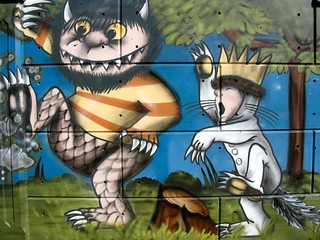 I only ever read one book by Maurice Sendak, Where the Wild Things Are. The man deserves a permanent place in the pantheon of literary giants just for the term “wild rumpus,” as far as I am concerned. As you may know, Maurice Sendak died earlier this week. I remember his book well from childhood. I’d like to read it again, but I can’t find my copy.
I only ever read one book by Maurice Sendak, Where the Wild Things Are. The man deserves a permanent place in the pantheon of literary giants just for the term “wild rumpus,” as far as I am concerned. As you may know, Maurice Sendak died earlier this week. I remember his book well from childhood. I’d like to read it again, but I can’t find my copy.
Sendak’s death has brought much expression of support and admiration for the man, along with some admissions of confusion over the book. I remember that Where the Wild Things Are was a different kind of book. This was not the shiny happy playtime childhood that I usually saw on PBS. Max was an unhappy child, and this story looked into some dark places in a child’s mind. He found a place where he could be happy, and be at peace, in a sense. Despite that, Max decided to come home. That is the real gift of this book: the message that it is okay for a child to be angry, or unhappy, or scared. Max is an imperfect child in an imperfect world, just like any of us.
He was a fascinating man, too, with quite a few opinions, as Stephen Colbert learned:
| The Colbert Report | Mon – Thurs 11:30pm / 10:30c | |||
| Grim Colberty Tales with Maurice Sendak Pt. 1 | ||||
|
||||
He had a committed relationship with another man for fifty years, whom he was never allowed to marry. He originally conceived Where the Wild Things Are as Where the Wild Horses Are, but he found that he couldn’t draw horses, so they became “wild things.” Also, according to that video, “wild rumpus” might have actually meant sex after all.
Also, I realize that the title of this post is from a D.H. Lawrence poem. It just fits here.
Thanks for your book. It got me through what seemed like some rough patches of childhood.

